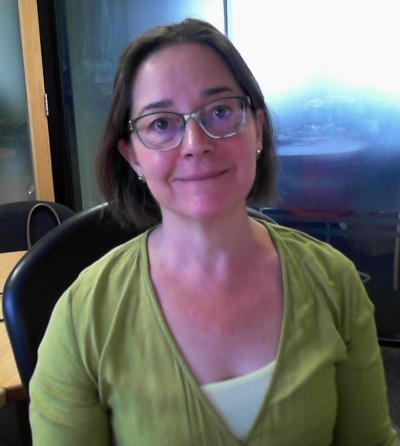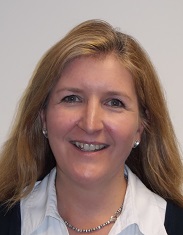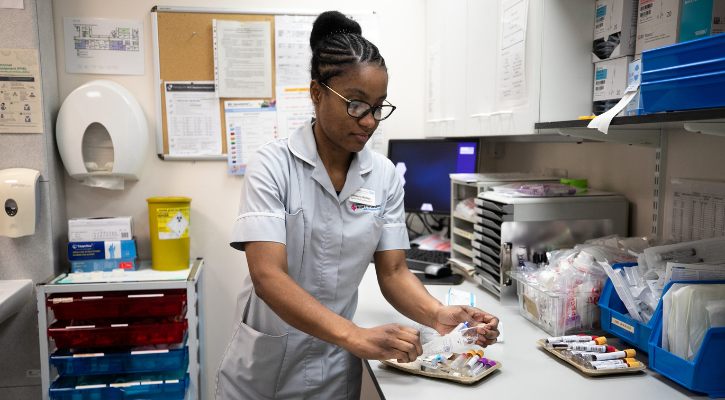The National Amyloidosis Centre at the Royal Free Hospital has been at the cutting edge of treatment and research into all aspects of amyloidosis for more than 25 years. Its highly specialised service has been providing diagnoses and care to amyloidosis patients locally and throughout the UK since 1999.
Amyloidosis is a rare disease caused by the abnormal deposition and accumulation of protein in the tissues of the body.
Amyloid deposits are primarily made up of protein fibres known as amyloid fibrils. These amyloid fibrils are formed when normally soluble body proteins clump together, and then remain in the tissues instead of safely going away. About 30 different proteins are known to form amyloid deposits in humans.
Amyloid deposits cause disease by gradually accumulating within organs and thereby disrupting tissue structure and damaging their function. In some cases, previously healthy organs can be substantially replaced by extensive amyloid deposits.
Organs that may be affected by amyloidosis include:
- kidneys
- heart
- liver and spleen
- nervous system
- gut and tongue
- bones and joints, especially the wrists
- skin
- blood vessels and clotting system
- eyes
There are many different types of amyloidosis. Each type has different causes, different symptoms and different treatments.
Information for patients
If you are in the UK, and your doctor has suggested you may have amyloidosis, you should ask them to refer you to the National Amyloidosis Centre at the Royal Free Hospital as soon as possible.
Outcomes are best when treatment is started early in the course of disease and you do not need to wait for a definite diagnosis of amyloidosis from your local doctor, or for determination of which type of amyloidosis.
Information for referring physicians
Referral letters for the amyloidosis service should be addressed to one of the following consultants:
- Dr Oliver Cohen, consultant haematologist
- Professor Marianna Fontana, hon consultant cardiologist
- Professor Julian Gillmore, hon consultant nephrologist
- Professor Helen Lachmann, hon consultant nephrologist
- Dr Shameem Mahmood, consultant haematologist
- Dr Ana Martinez Naharro, consultant cardiologist
- Dr Sriram Ravichandran, consultant haematologist
- Professor Ashutosh Wechalekar, hon consultant haematologist
- Dr Carol Whelan, consultant cardiologist
Please send referrals to:
National Amyloidosis Centre
Royal Free Hospital
Pond Street
London
NW3 2QG
Email: rf.
Please include the following details in the referral:
- Patient contact details, including full address, email and telephone number(s).
- Name and full contact details of referring consultant and/or GP.
- Any recent biopsies including bone marrow (date and hospital where performed) and a copy of the final biopsy report.
- Results of previous imaging (date and hospital where performed) and a copy of the final report: echocardiogram, DPD or other bone scans, cardiac MRI, CT or CT PET scan results, skeletal survey.
- Any implanted metal work or devices such as pacemakers or ICD and if they are CMR compatible.
- If the patient has organ failure details of dialysis or organ transplantation.
- Relevant blood tests, in particular:
- Serum immunoglobulins, serum and urine electrophoresis and immunofixation and serum free light chain assays.
- Renal and liver function, quantification of proteinuria.
- Cardiac biomarkers such as NT pro-BNP and troponin.
- Previous bloods which assess chronic inflammation such as CRP, ESR and WBC if inflammatory disorders are suspected.
If you wish to check availability of appointments, please contact Rizwan Shaukat:
Tel: 020 7433 2732
Email: rf.
If you wish to discuss any clinical issues prior to the referral, please contact the Amyloid Centre nurse helpline on 07790 989 695.
Cerebral amyloid angiopathy
Please note that the National Amyloidosis Centre does not have expertise in the investigation/management of cerebral amyloid angiopathy. If that is the suspected diagnosis, please consider referral to:
Professor David Werring, Comprehensive Stroke Service, National Hospital for Neurology and Neurosurgery, Queens Square, London, WC1N 3BG.
Our clinical evaluation usually takes one to two days, and hospital or hotel overnight accommodation can be arranged where necessary.
We recommend you bring a family member or friend with you if possible. There is a lot of information to take in and it will help to have someone with you to support you and help you. The evaluation includes:
- blood and urine tests
- ECG (electrocardiogram to check your heart’s rhythm and electrical activity) and echocardiogram (ultrasound scan of the heart)
- whole body SAP scan to establish the distribution and quantity of amyloid deposits
- additional tests in some patients may include:
- abdominal fat biopsy
- bone marrow biopsy
- DPD scan of the heart
- cardiac MRI scan
- physician evaluation
- specialist nurse consultation
The doctor who evaluates you will explain your diagnosis and make recommendations regarding a suitable treatment plan. The specialist nurses explain and discuss practical nursing issues during the initial evaluation and are available afterwards for patients and relatives to contact with any questions that arise.
Our approach to each patient with amyloidosis is tailored individually to the type of amyloid and to patients’ particular problems.
Having a SAP scan
The safe, painless SAP scan enables doctors at the National Amyloidosis Centre to pinpoint the location and amount of amyloid within your body’s organs without the need for a biopsy (where a sample of tissue is taken from the body).
This routine clinical test was developed by Professor Sir Mark Pepys and Professor Philip Hawkins at the centre in 1987 to provide an assessment of both the initial extent of each patient’s amyloidosis and how it changes over time.
It is the only existing method for non-invasive diagnosis and comprehensive follow up of total body amyloidosis. The National Amyloidosis Centre is the only place in the world where the SAP scan is routinely available.
Serum amyloid P component (SAP) is a normal blood protein, present in everybody.
In healthy people there are very small quantities of SAP, and it is only present inside the bloodstream, but not in the organs.
In the bodies of patients with amyloidosis, in addition to the small quantities of SAP in the blood, there are large quantities of SAP coating the amyloid deposits in the organs. In the SAP scan, all of this coating shows up clearly, as if it has been highlighted, or labelled.
The test involves injection of a small amount of radioactive labelled human SAP as a tracer into a vein and then either that afternoon or the next day lying down for about 25 minutes for the scan. The camera is silent and takes pictures from your head to your knees. It is not enclosed, so claustrophobia is not usually a problem.
Your amyloidosis treatment
Following assessment for amyloidosis at our centre, treatment is usually given at your local hospital or regional centre in conjunction with advice from the National Amyloidosis Centre (NAC). Most patients with amyloidosis need long term surveillance, including follow-up visits at the NAC.
Read treatment information for the different types of amyloidosis.
Clinical trials at the National Amyloidosis Centre
The NAC is very active in research and therapy trials in different types of amyloidosis. The studies we can offer depend on which are currently recruiting and eligibility requirements. Please speak to your nurse or doctor if you would like to find out more.
Amyloidosis Research Fund
If you would like to support research into amyloidosis or patient-related activities of the NAC, our charitable fund is managed by the Royal Free Charity and you can make a donation or take part in fundraising for us. Every penny is received with sincere gratitude and is used for amyloidosis research and education.
Amyloidosis is a rare disease. Most people have never heard of it until they or their family member or friend is diagnosed. Many doctors know little about the condition. Patients, friends, family and carers often have many questions.
On this page, you will find patient information videos and details of patient support groups you can join.
Patients are at the heart of everything we do at the National Amyloidosis Centre. We want to continue to improve both the clinical care we provide and our patients’ overall experience.
We aim to do this by listening to what our patients tell us and by putting their suggestions into practice. If you have any feedback about our services, please email rf.
Patient support groups
Myeloma UK groups — for patients with AL amyloidosis
The charity Myeloma UK welcomes patients with AL amyloidosis at support groups in around 60 locations around the UK — read more information on Myeloma UK.
The UK ATTR Amyloidosis Patients’ Association (UKATPA)
This charity was founded in 2017 by a group of UK patients with transthyretin (TTR) systemic amyloidosis (ATTR) to:
- provide support and information for patients with ATTR amyloidosis
- involve patients in all aspects of management and research
- work closely with the National Amyloidosis Centre to promote interdisciplinary communication with local doctors treating ATTR patients throughout the UK
This service has received grant funding from the Royal Free Charity.
 Translate
Translate






